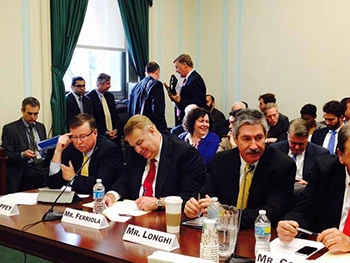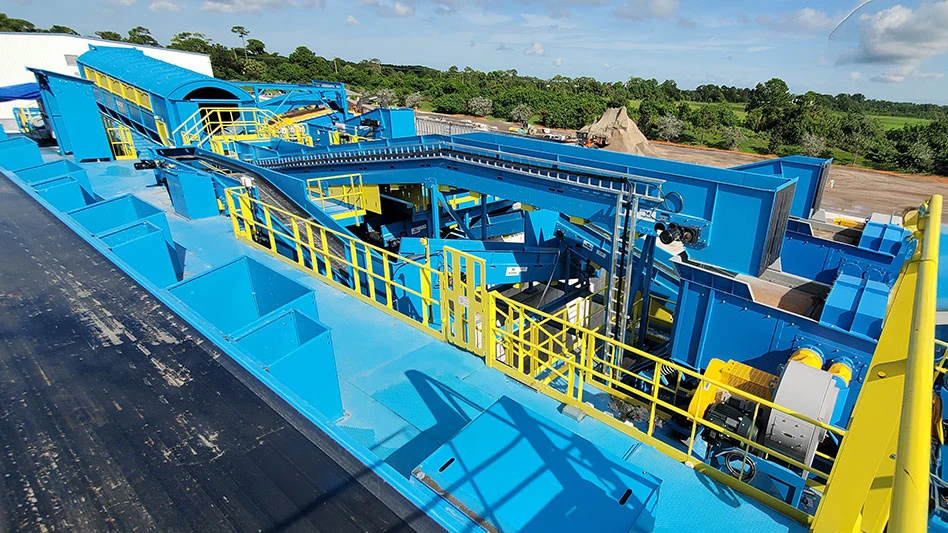
| Pictured from left: Mario Longhi of U.S. Steel, John Ferriola of Nucor Corp. and, Mike Rippey of ArcelorMittal USA testify before nearly two-dozen congressman from steel-producing states. |
Congressman Tim Murphy, chairman of the Congressional Steel Caucus, and Rep. Pete Visclosky, vice chairman of the Steel Caucus, held the annual “State of Steel” hearing March 26, 2015, in Washington. In total, nearly two-dozen Congressmen from steel-producing states attended the caucus.
The caucus heard testimony from a number of top steel industry executives on the challenges the industry currently is facing.
The speakers who testified during the State of Steel hearings included:
- Mario Longhi, president and CEO of United States Steel Corp.;
- Carl Moulton, chairman, the Specialty Steel Industry of North America;
- John Ferriola, chairman, CEO and president, Nucor Corp.;
- Michael Rippey, chairman of ArcelorMittal USA www.usa.arcelormittal.com and the American Iron and Steel Institute (AISI);
- Leo Gerard, international president of the United Steelworkers;
- Tracy Porter, president of Commercial Metals Co., Americas Division; and
- Douglas Polk, vice president, industry affairs, Vallourec USA Corp.
In his opening remarks, Murphy said, “Despite having the world’s highest quality product and most talented workforce, the domestic steel sector is not faring well. Part of the problem is that some global trading partners seek to thwart the spirit and letter of international trade laws.
“As well,” he continued, “illegal dumping and currency manipulation yield tremendous harm to the American steel industry, while giving foreign competitors an unfair leg up. For example, this year alone, China is on pace to produce as much steel as the rest of the world combined, despite steel usage in China only being up 1 percent in 2014.”
In his prepared remarks, ArcelorMittal’s Rippey said, “Today, the global economy is presenting serious challenges for us. Recovery since the Great Recession has been slow and uneven. While U.S. economic conditions have improved, Europe remains weak, and growth in China and other developing economies have slowed. In times like these, we know what happens. We’ve seen it before. Last year, finished steel imports increased 36 percent, while U.S. producers increased shipments by only 3 percent. Steel imports captured 28 percent of the U.S. market, a historic level.”
Rippey said he expects this trend to continue. “Based on the first few months of this year, the outlook for 2015 is the same. The import surge is particularly troubling given that U.S. producers are currently using only 69 percent of production capacity.”
Ripley continued, “In 1998, when imports also reached a record high, prices and production dropped, resulting in a crisis that caused several bankruptcies of major steel companies in the early 2000s.”
In his testimony, Nucor’s Ferriola said that despite an improving U.S. economy, which should benefit domestic steel producers, the major beneficiaries have been less-efficient foreign producers. “Domestic steel shipments were up only 2 to 3 percent last year. American steel mills are running at only 69 percent of their capacity. Imports are having a negative impact on U.S. steel industry employment and investment,” he said.
To remedy the problem, Ferriola called on the Commerce Department to more aggressively enforce fair trading policies. He provided an example: “In a case brought by Nucor and other companies, the Department of Commerce ruled that Turkey was providing its rebar producers with energy subsidies. But Commerce concluded that these subsidies were of hardly any value and applied a duty of only about 1 percent. How could energy subsidies have such little value? Energy costs run in the hundreds of millions of dollars annually for a company like ours.
“Failing to impose a tough duty sent a clear message to Turkish rebar producers that they could just keep sending more,” Ferriola continued. “Rebar imports from Turkey averaged 52,000 tons per month when the steel industry filed its case in 2013. In 2014, they averaged 80,000 tons per month. And in January 2015, rebar imports from Turkey were more than 108,000 tons.:
He concluded, “We must take a much tougher line with countries that blatantly violate international rules. We need real solutions that will provide effective relief and change market-distorting behavior.”
Porter said, “As my colleagues have already stated this morning, we are facing extremely challenging market conditions. Despite slowly improving domestic demand and a number of recent trade case victories, U.S. markets continue to be flooded with offshore imports from a range of nations and in virtually every product category, thereby preventing domestic companies from realizing the benefits of our nation’s economic recovery.
“We need to get serious about enforcing trade laws and holding our trading partners accountable to the rules. Simply put, the United States cannot continue to be the market of last resort for the world’s steel overcapacity problem,” Porter added.
“As Congress and the Obama administration consider important topics such as Trade Promotion Authority and the Trans-Pacific Partnership negotiations, I reiterate SMA’s position that all future U.S. trade agreements should:
- include strong and enforceable provisions on currency manipulation;
- establish disciplines on state-owned enterprises;
- maintain the strength and effectiveness of U.S. trade remedy laws;
- promote firm and effective rules of origin; and
- ensure that labor and environmental negotiations do not result in unfair disadvantages for U.S. manufacturers.
Polk discussed the negative impact steel imports have had on the domestic pipe and tube markets.
In his testimony, he pointed out that in 2014 pipe and tube imports took over 58.2 percent of the steel pipe and tube product market. “Much of these imports arrived from China and Korea, with India and Turkey following,” Polk said.
Polk noted that U.S. producers filed trade cases against OCTG (oil country tubular goods) imports from nine countries, including Korea, July 2, 2013. Ultimately, “the industry received relief from six countries in September 2014.”
However, he added, “Korea has taken the U.S. to the WTO (World Trade Organization) to challenge these final results.”
Polk stressed that the problems are not limited to OCTG products. “After huge increases in imports of welded line pipe from Korea and Turkey, the U.S. industry filed cases in October 2014. Line pipe also is used in the energy sector and is the primary product used to transport oil and gas. In January and February 2015, imports of OCTG and line pipe surged by more than 50 percent, even though the market was declining due to falling energy prices and the drop in the rig count.”
Polk noted that a driving factor for these imports has been the “chronic issue of governments subsidizing global overcapacity.”
For example, Polk said, “It is widely recognized that the Chinese government has subsidized over 1 billion tons of steel capacity in China. Of this, there are over 250 million metric tons of excess capacity.”
The result, Polk said, was that “China is the world’s largest steel exporter by far, with nearly 100 million metric tons of steel exports in 2014 at prices more than one quarter below world prices.”
To remedy this, Polk said, the “only solution is to insist that the U.S. government enlist other governments around the world to take Chinese violations of the subsidy rules to the WTO for redress. If we do not take swift and appropriate actions, I fear we will continue to see the slow demise of the domestic industry. It is time that our government take action to hold China accountable to the terms of their WTO accession by pursuing violations by China of the Subsidies and Countervailing Measure (SCM) Agreement.”
Latest from Recycling Today
- Greenwave raises revenue but loses money in Q2 2025
- Recycled steel prices hold steady
- EY says India’s need for scrap imports will continue
- Coming full circle
- Amcor, DCM introduce fertilizer packaging with 35 percent recycled content
- Comstock Metals gets closer to commissioning commercial-scale solar panel recycling facility
- Washington selects Circular Action Alliance as PRO
- Smurfit Westrock expands in Latin America





